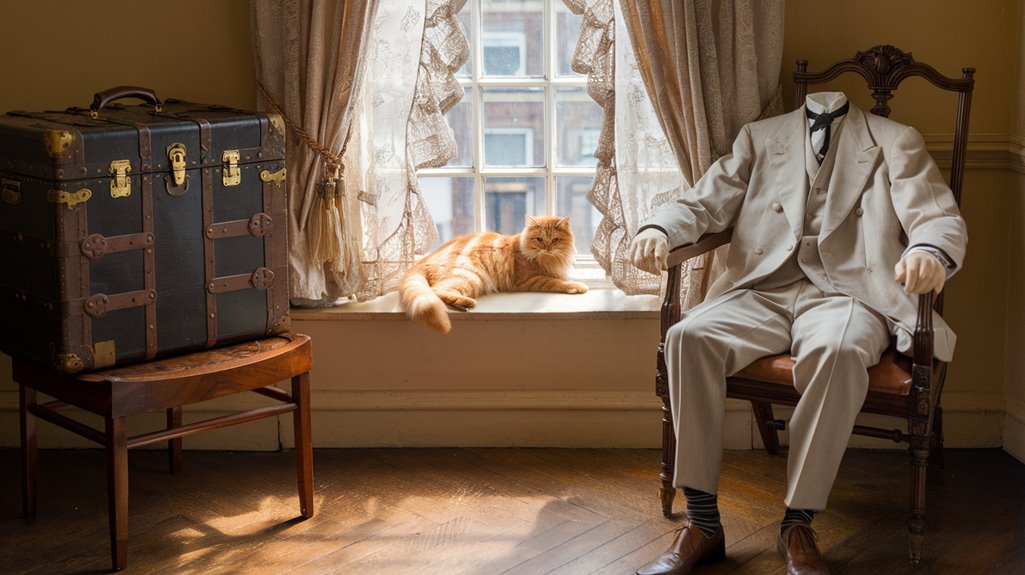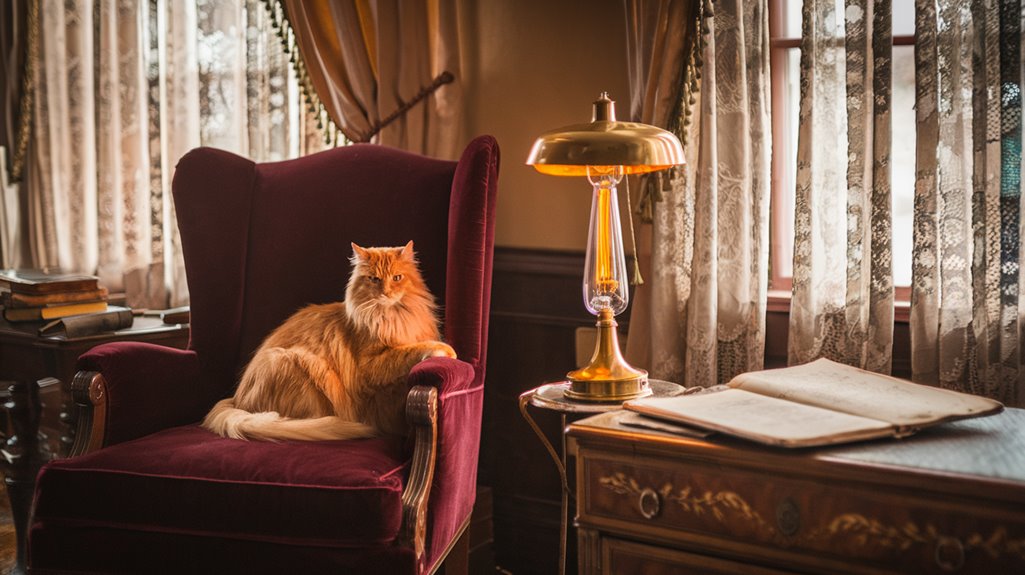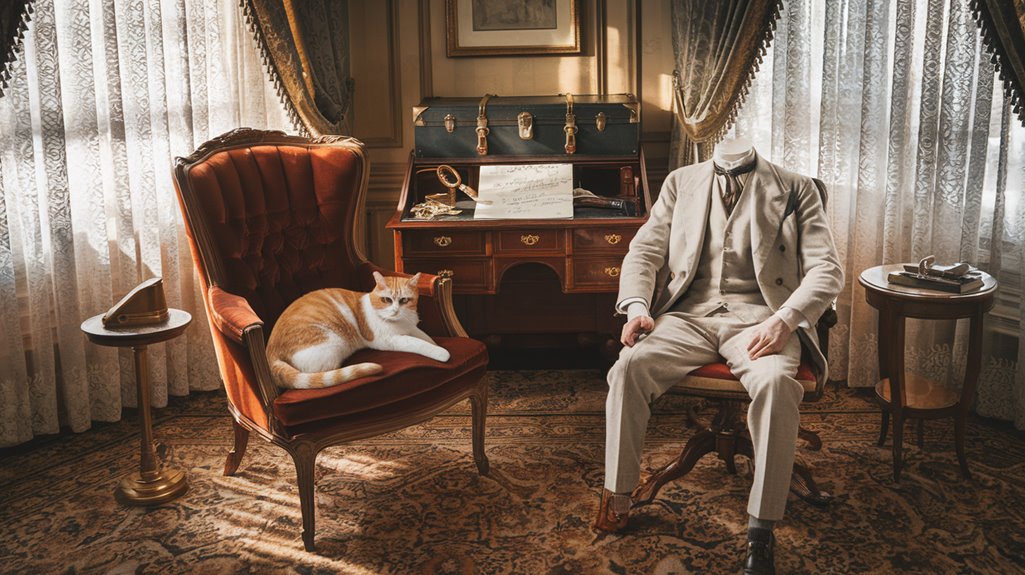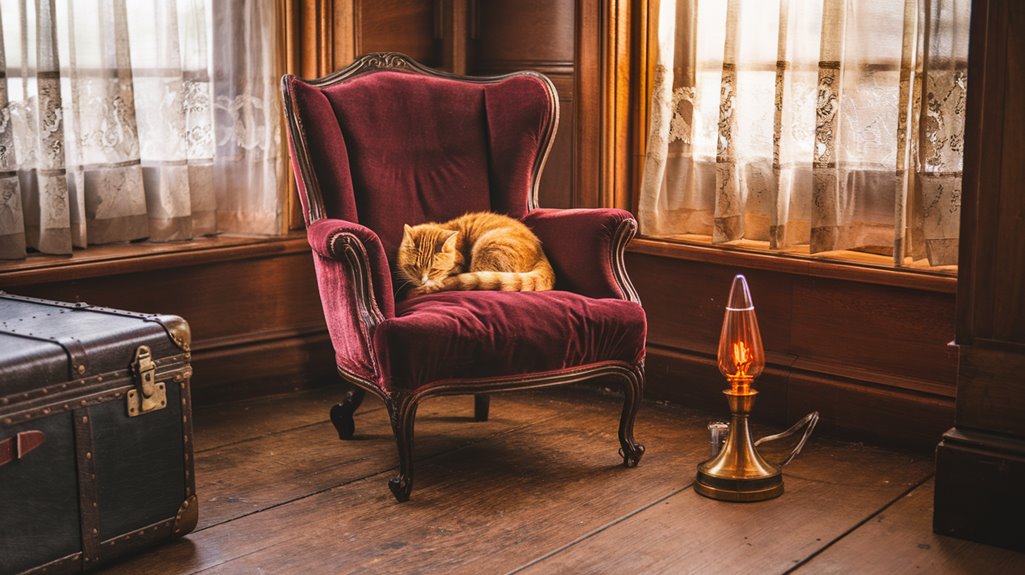Mark Twain Rented Cats While Traveling
Picture yourself in Dublin, 1906, watching Mark Twain carefully inspect three kittens he's about to rent for his travels. You might wonder why America's most celebrated author wouldn't simply buy cats or travel without them. But Twain's peculiar arrangement tells us something deeper about both the man and his times. His decision to rent cats, including a pair of twins he nicknamed Sackcloth and Ashes, reveals an unexplored side of literary history that challenges our understanding of this complex figure.
The Peculiar Practice of Cat Rentals

Three peculiar kittens – Sackcloth and the twin Ashes – marked the beginning of Mark Twain's unconventional cat rental practice in 1906.
You might find it surprising that the famous author arranged these feline rentals with a local farmer's wife in Dublin, New Hampshire, to guarantee cat companionship during his travels and summer vacations.
What made this arrangement even more interesting is that Twain's rental payments weren't just temporary – they covered the cats' care for their entire lives.
This practice reflected his deep love for cats, as he owned 19 of them throughout his life.
When he couldn't bring his own cats along, he'd seek rentals to satisfy his ailurophilia.
He treated his rented companions with the highest regard, considering them royalty in their own right.
Twain often expressed that he preferred cats over humans when it came to companionship.
The growing popularity of rentals continues today, with the equipment rental market reaching a staggering $90 billion value in 2020.
A Man Who Never Met a Cat He Didn't Like
Mark Twain's cat rental arrangements barely scratched the surface of his deep feline devotion.
You'll find few historical figures who understood cat behavior as intimately as Twain, who owned up to 19 cats at once and treated each as royalty.
When traveling abroad, he would often seek two Ossie cats as temporary companions.
His appreciation for feline personality traits ran deep, particularly their independence and self-reliance.
When his beloved cat Bambino went missing, he didn't hesitate to offer a reward for its return.
During one notable summer in Dublin, New Hampshire, he rented three kittens for companionship.
You might be amused to learn that Twain would bow to cats at doorways, letting them enter first while addressing them as "gentlemen."
He firmly believed that cats were superior to humans in many ways, famously noting that crossing a man with a cat would improve the man but diminish the cat.
His respect for these creatures was absolute and unwavering.
Tales of Sackcloth and Ashes: The Dublin Kittens
During the summer of 1906, the quaint town of Dublin, New Hampshire, became home to a peculiar rental arrangement.
Mark Twain rented three kittens from a local farmer's wife: one named Sackcloth and identical twins both called Ashes. These felines would become Twain's travel companions during his stay. The author, who owned nineteen cats throughout his life, was no stranger to feline companionship.
You can glimpse the kittens' personalities through a charming interaction observed by Twain's biographer.
When two of the kittens waited at a screen door, Twain held it open, saying, "Walk in, gentlemen. I always give precedence to royalty." This gesture perfectly captured his deep respect for his feline friends.
The arrangement wasn't just temporary – Twain's rental payment guaranteed the kittens would be cared for throughout their lives, showcasing his commitment to their well-being. The cats provided much needed comfort to the aging author during his time in Dublin.
Beyond Rentals: Twain's Personal Cat Companions
A passionate cat enthusiast, Mark Twain's love for felines extended far beyond his famous rental arrangements.
You'll find that his personal collection of cats showcased unique cat personalities, with up to 19 felines sharing his home at once. When away from home, he would often rent three kittens to maintain his feline companionship. His dedication to feline companionship was evident in the creative names he chose, from Beelzebub to Zoroaster. The cat's secretary Miss Lyon eventually found Bambino on University Place after he had gone missing.
Here's what made Twain's relationship with his cats remarkable:
- He valued cats over human company, famously stating that crossing man with cat would only benefit mankind.
- His most notable companion, Bambino, prompted him to place a $5 reward advertisement when lost.
- He guaranteed lifetime care for his cats, even covering expenses for rented ones.
- He incorporated his beloved felines into his literary works, including "The Adventures of Tom Sawyer."
The Legacy of America's Most Famous Cat Enthusiast

Literary legend Mark Twain's passion for cats has resonated through generations, influencing writers, artists, and cat enthusiasts alike.
During his extensive tours across America and Europe, he rented local kittens rather than travel with his own cats.
His unique approach to cat companionship, including his innovative rental practices, demonstrated a profound respect for felines that was ahead of his time.
 early boyhood days in Hannibal, Missouri.
early boyhood days in Hannibal, Missouri.
You'll find Twain's literary influence extends beyond his written works, as his devotion to cats helped normalize the idea that these animals deserve our utmost respect and care.
He showed this through his willingness to provide lifetime care payments for his rented companions and his famous declaration that cats are royalty.
Today, you can see Twain's impact in how we view and value cat companionship, as his pioneering approach to feline relationships helped shape modern attitudes toward these beloved pets.










